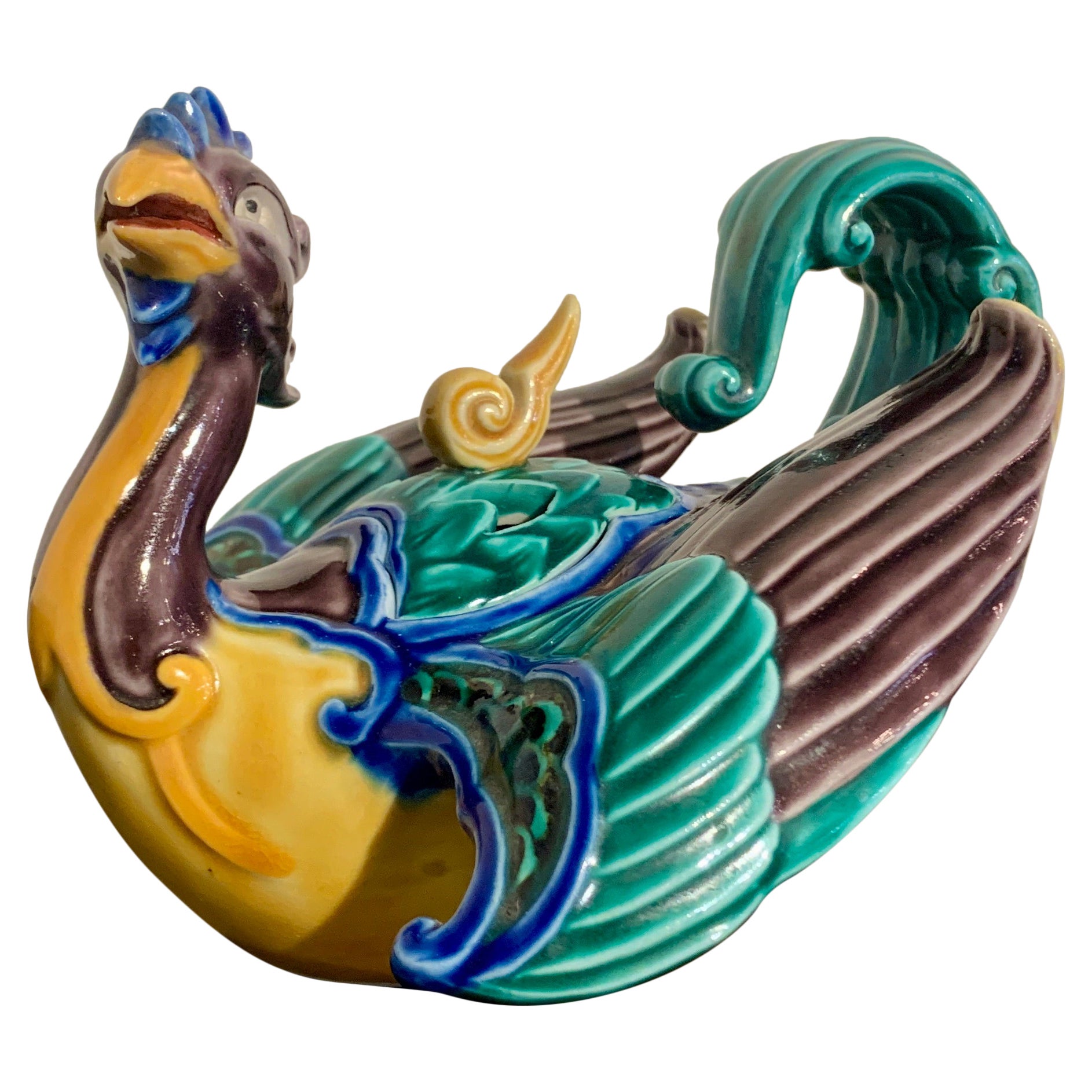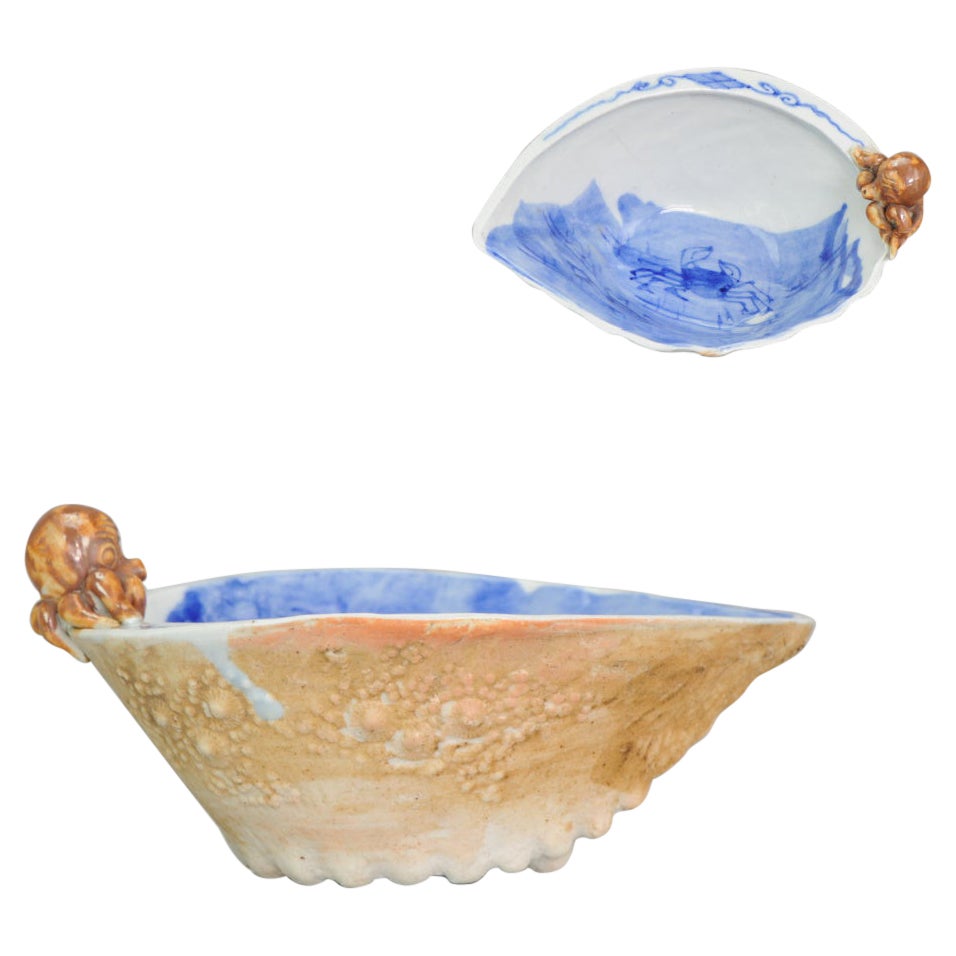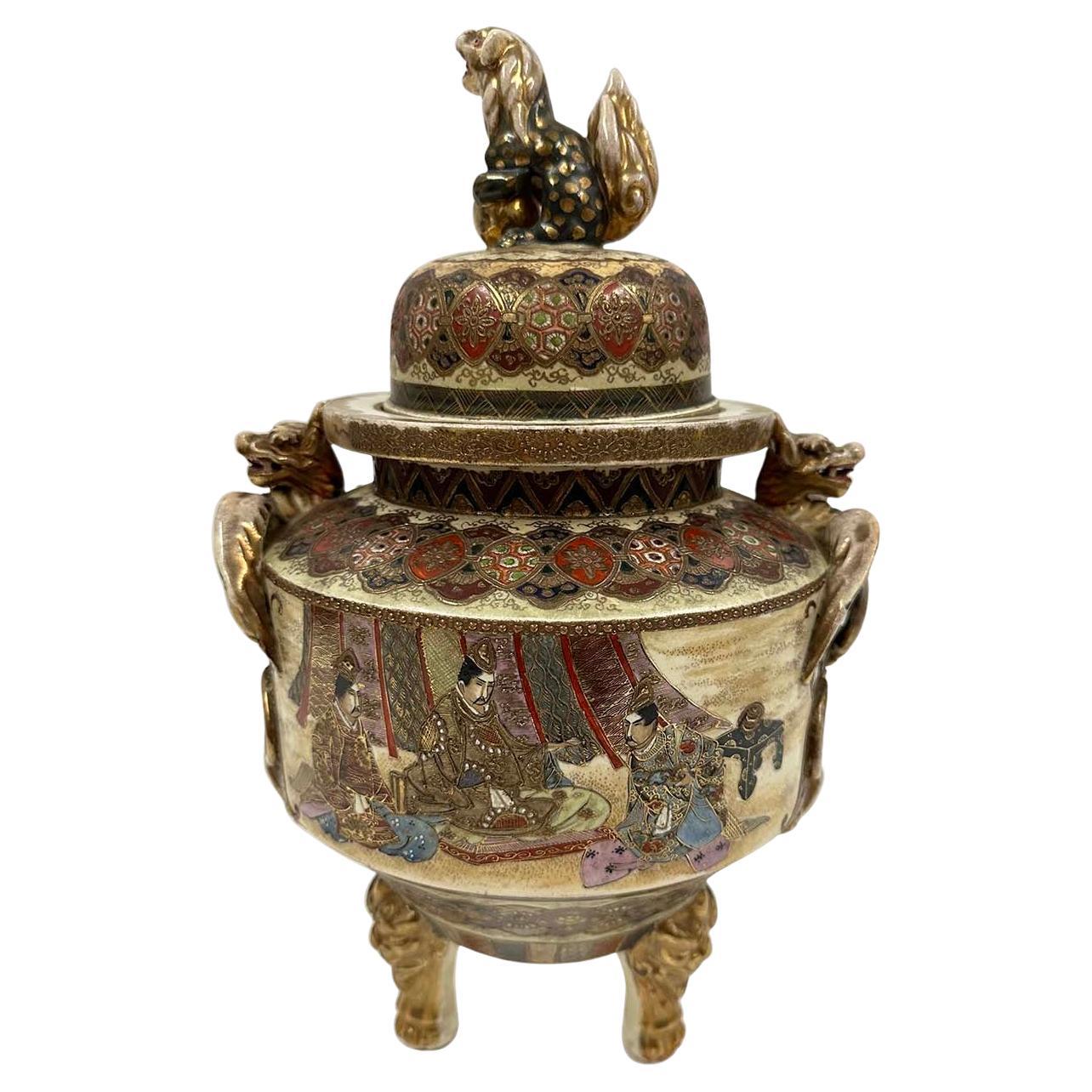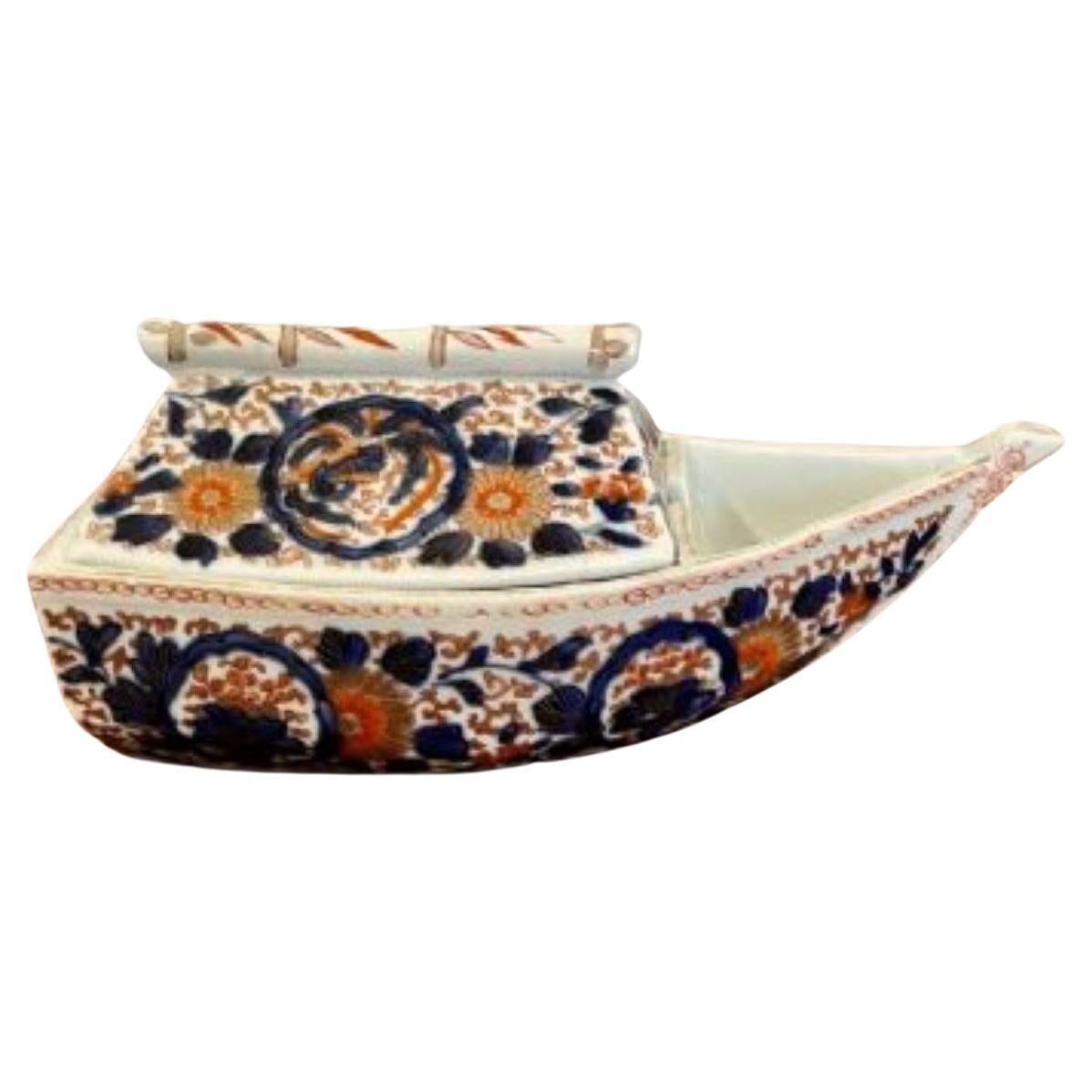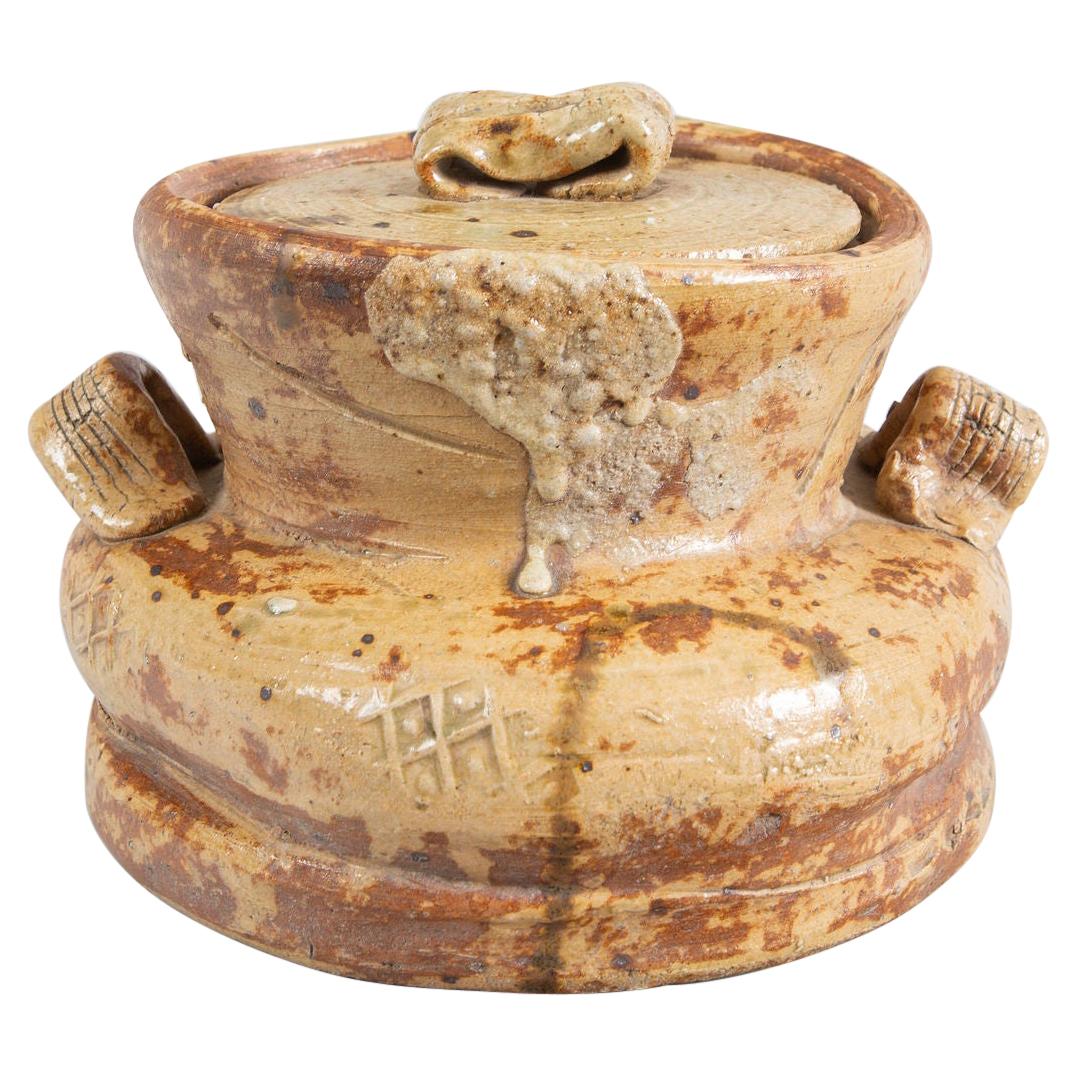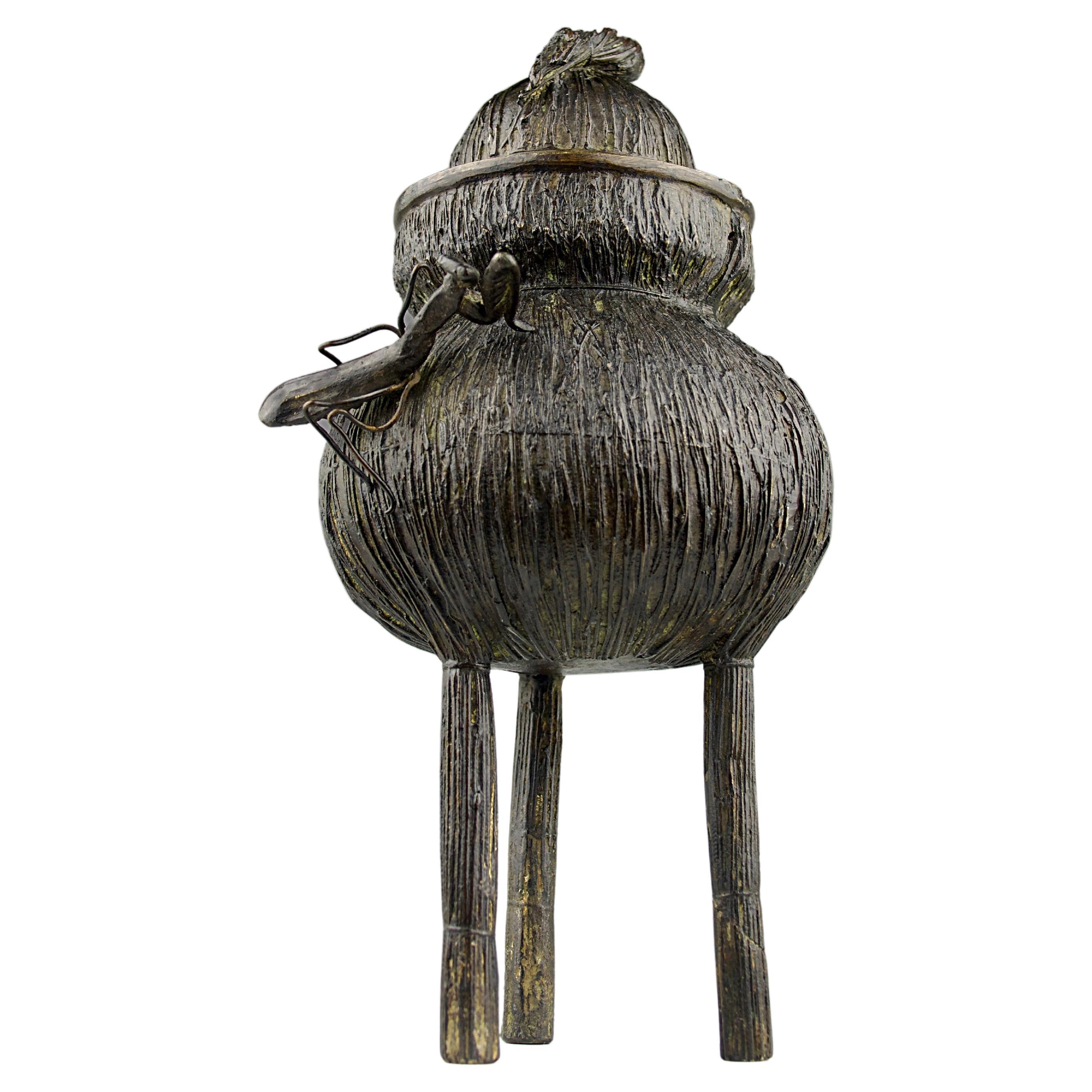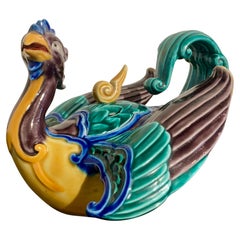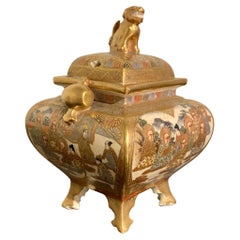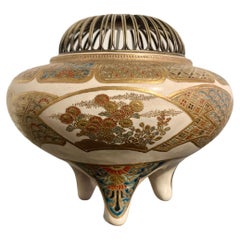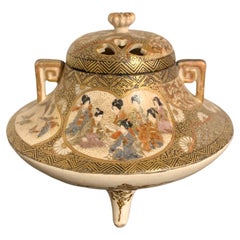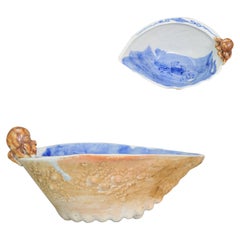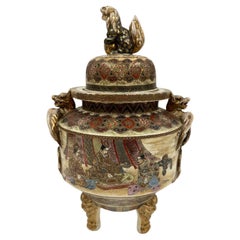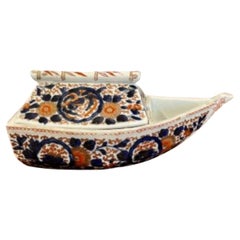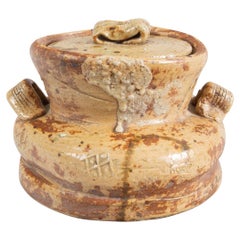Items Similar to Japanese Kutani Treasure Boat 'Takarabune' Censer, Taisho Period, Japan
Want more images or videos?
Request additional images or videos from the seller
1 of 13
Japanese Kutani Treasure Boat 'Takarabune' Censer, Taisho Period, Japan
$1,500
£1,146.83
€1,320.92
CA$2,101.96
A$2,346.64
CHF 1,229.60
MX$28,725.18
NOK 15,615.99
SEK 14,723.89
DKK 9,858.13
About the Item
A wonderful Japanese Kutani porcelain incense burner, koro, in the form of a treasure ship, Takarabune, Taisho Period (1912 - 1926), Japan.
The censer boldly modeled as the legendary Takarabune, or Treasure Ship, a mythical ship said to carry the shichifukujin, the Seven Lucky Gods, around the heavens during the first days of the New Year, visiting lucky humans to bring blessings and prosperity.
The black bodied, single mast ship sails on the water, its sail full of wind and decorated with the character "takara", meaning treasure. The pierced top of the ship serving as the cover for the censer. It is loaded with magical items and treasure, most prominently, a large coral branch, and also including the magical hammer of Daikokuten, called uchide no kozuchi, the hat of invisibility, called kakuregasa, the scrolls of wisdom and life belonging to Jurojin, large coins, and other treasures.
The back of the sail also ingeniously pierced. When in use, the escaping wisps of smoke giving the impression of the Treasure boat passing through clouds or mist.
The ship of fine porcelain, and glazed in wonderful enamels of black, green, red, blue, and yellow, with gilt highlights throughout.
The underside stamped with a four character mark partially reading "Kutani". The name of the artist or studio partially obscured.
- Dimensions:Height: 7 in (17.78 cm)Width: 7 in (17.78 cm)Depth: 4.75 in (12.07 cm)
- Materials and Techniques:
- Period:1910-1919
- Date of Manufacture:1912-1926
- Condition:Wear consistent with age and use. In fine condition. WIth some adhesive residue to the interior. No chips, cracks or repairs noted.
- Seller Location:Austin, TX
- Reference Number:1stDibs: LU894727714352
About the Seller
5.0
Platinum Seller
Premium sellers with a 4.7+ rating and 24-hour response times
Established in 2001
1stDibs seller since 2010
345 sales on 1stDibs
Typical response time: <1 hour
- ShippingRetrieving quote...Shipping from: Austin, TX
- Return Policy
Authenticity Guarantee
In the unlikely event there’s an issue with an item’s authenticity, contact us within 1 year for a full refund. DetailsMoney-Back Guarantee
If your item is not as described, is damaged in transit, or does not arrive, contact us within 7 days for a full refund. Details24-Hour Cancellation
You have a 24-hour grace period in which to reconsider your purchase, with no questions asked.Vetted Professional Sellers
Our world-class sellers must adhere to strict standards for service and quality, maintaining the integrity of our listings.Price-Match Guarantee
If you find that a seller listed the same item for a lower price elsewhere, we’ll match it.Trusted Global Delivery
Our best-in-class carrier network provides specialized shipping options worldwide, including custom delivery.More From This Seller
View AllJapanese Aote Kutani Phoenix Censer, Koro, Showa Era, Japan
Located in Austin, TX
A fantastic Japanese Aote type Kutani incense burner, koro, in the form a phoenix, Showa era, circa 1930's, Japan.
The censer, koro, gracefull...
Category
Vintage 1930s Japanese Showa Ceramics
Materials
Porcelain
Small Japanese Satsuma Incense Burner, Koro, Meiji Period, Late 19th Century
Located in Austin, TX
A fine Japanese Satsuma stoneware incense burner, koro, Meiji Period, late 19th century, Japan.
The koro of square shape with curved sides,...
Category
Antique 1890s Ceramics
Materials
Enamel
Japanese Satsuma Incense Burner, Koro, Meiji Period, Late 19th Century, Japan
Located in Austin, TX
A fine and elegant Japanese Satsuma tripod incense burner, koro, with pierced metal lid, signed Eizan (?) Meiji Period, late 19th century, Japan.
The koro, or censer, features a stoneware body of slightly compressed globular form, supported on three short and squat legs. The wide mouth with a recessed metal rim, and topped by an openwork metal lid topped with overlapping chrysanthemum blossoms of silver repousse.
The body of the koro finely painted with fan shaped cartouches. The fans in the foreground with sprays of blossoming chrysanthemum. The fans in the background with intricate geometric brocade designs.
The shoulder of the incense burner decorated with cartouches formed as stylized chrysanthemum petals, and intricately decorated with geometric and floral brocade designs.
The painting finely done in raised gilt and polychrome enamels, including the highly desirable gosu blue...
Category
Antique Late 19th Century Japanese Meiji Ceramics
Materials
Silver, Metal
Japanese Satsuma Tripod Censer, Koro, Meiji period, Early 20th Century, Japan
Located in Austin, TX
A small and finely decorated Japanese Satsuma tripod incense burner (koro), signed Kyozan, Meiji period, circa 1900, Japan.
The censer, koro, with a compressed body supported by t...
Category
Antique Early 1900s Japanese Meiji Ceramics
Materials
Stoneware
Chinese Export Kendi, Swatow Ware, Porcelain with Polychrome Enamels, circa 1900
Located in Austin, TX
A delightful Swatow ware Chinese export shipwreck porcelain kendi featuring a writing dragon and an apocryphal Tongzhi mark, late 19th or early 20th centur...
Category
Antique Early 1900s Chinese Qing Ceramics
Materials
Porcelain
Japanese Lacquer Incense Burner, Koro, Edo period, mid 19th century, Japan
Located in Austin, TX
An elegant and refined Japanese lacquer koro, incense burner, in the form of a chaire, tea caddy, Edo Perio, mid 19th century, Japan.
The barrel shaped koro formed as a traditional ...
Category
Antique Mid-19th Century Japanese Edo Lacquer
Materials
Copper
You May Also Like
Antique ca 1900 Japanese Hirado'?' Sauce Boat Richly Decorated Marked
Located in Amsterdam, Noord Holland
Description
Sharing with you is this nice piece of Japanese porcelain. A sauce boat with crabs and an octopus. Could be hirado ware, not found a similar p...
Category
Antique 19th Century Japanese Meiji Ceramics
Materials
Porcelain
$2,833 Sale Price
20% Off
Antique Japanese Meiji Period Satsuma Incense Burner Censer
Located in Pomona, CA
UP for you consideration is a beautiful antique Meiji period Japanese gold gilt satsuma incense burner marked/signed by Kinkozan. Very fine hand...
Category
Early 20th Century Japanese Chinese Export Urns
Materials
Porcelain
$971 Sale Price
25% Off
Unusual antique Japanese imari quality boat shaped dish
Located in Ipswich, GB
Unusual antique Japanese imari quality boat shaped dish having an unusual antique Japanese imari boat shaped dish with a removable lid revealing a storage compartment, decorated with...
Category
Early 20th Century Ceramics
Materials
Ceramic
Iga Mizusashi 'Water Container for the Tea Ceremony'
Located in Hudson, NY
17th to 18th century Iga ware from Fushinan, Kyoto. Iga embodies the essence of tea ceremony's requirements for wabi-sabi, which appreciates the beauty in imp...
Category
Antique Early 18th Century Japanese Edo Ceramics
Materials
Ceramic
Incense Burner, Japan, 19th Century
Located in PARIS, FR
Beautiful incense burner in the shape of a straw basket with a praying mantis sitting on top. Bronze, Japan 19th century.
Good condition, oxidation, one leg missing from the prayi...
Category
Antique Mid-19th Century Japanese Meiji Urns
Materials
Bronze
Late 18th Century Chinese Export Porcelain Sauce Boat
Located in Atlanta, GA
Late 18th Century Chinese Export Porcelain Sauce Boat
Category
Antique Late 18th Century Chinese Porcelain
Materials
Porcelain
